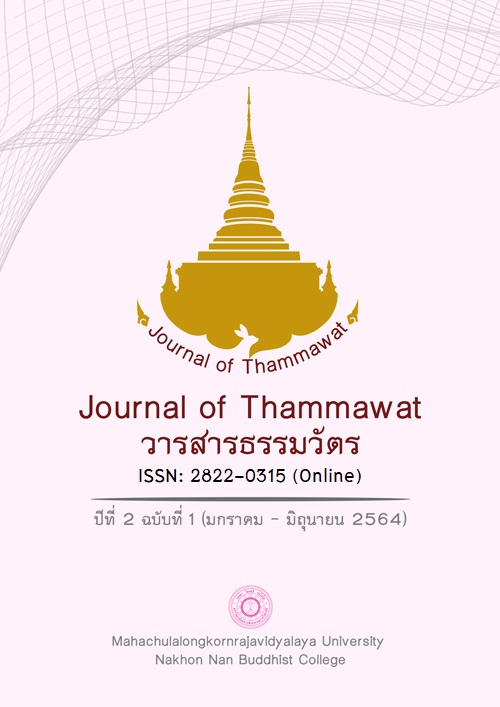Human Development according to the Threefold Training for Building a Strong and Smart Society
Main Article Content
Abstract
Human development in Buddhism, this is human development according to threefold training principles by focusing on the practice or training themselves in accordance with precept, concentration and wisdom as follows: 1) the precept development is a method to the practice of training for self-precept, which is to control oneself in disciplines both physically and verbally, 2) the concentration development, which is the practice or training oneself to have concentration, including having the consciousness, the determined mind, the distracted mind to stimulate, all vices, and 3) the wisdom development, which is the practice or training oneself to have wisdom, the power of resolute mind that can understand the problems and solve problems until enlightenment that can understand to solve problems from learning and wisdom occurs in one's self, with having the concepts in those stories accurate. Human development according to the threefold training principle is the complete human development both physically, verbally, mentally, emotionally, and intellectually which is ready to help develop the nation completely in all aspects, including economic, social, political and cultural and leading to a stable, prosperous and sustainable country.
Article Details

This work is licensed under a Creative Commons Attribution-NonCommercial-NoDerivatives 4.0 International License.
References
ธีระ นุชเปี่ยม. (2561). การพัฒนามนุษย์ในบริบทโลก. นนทบุรี: มหาวิทยาลัยสุโขทัยธรรมาธิราช.
บุญมี แท่นแก้ว. (2539). จริยศาสตร์. กรุงเทพฯ: โอเดียนสโตร์.
พระพรหมคุณาภรณ์ (ป.อ. ปยุตฺโต). (2553). พจนานุกรมพุทธศาสน์ ฉบับประมวลศัพท์. กรุงเทพฯ: สหธรรมิก.
พระพรหมคุณาภรณ์ (ป.อ.ปยุตฺโต). หัวใจพระพุทธศาสนา. พุทธจักร. 61(5), 7.
พระพุทธโฆษาจารย์. (2538). วิสุทธิมรรคแปล ภาค 1 ตอน 1. พิมพ์ครั้งที่ 8. กรุงเทพฯ: โรงพิมพ์มหามกุฎราชวิทยาลัย.
พระอุปติสสเถระ. (2548). วิมุตติมรรค. แปลโดย พระเทพโสภณ (ประยูร ธมฺมจิตฺโต) และคณะ. กรุงเทพฯ: โรงพิมพ์มหาจุฬาลงกรณราชวิทยาลัย.
พุทธทาสภิกขุ. (2549). การศึกษาสมบูรณ์แบบ : คือวงกลมที่คุ้มครองโลกถึงที่สุด. กรุงเทพฯ: อุษาการพิมพ์.
สำนักงานเลขาธิการสภาการศึกษา กระทรวงศึกษาธิการ. (2562). รายงานการศึกษาไทย พ.ศ. 2561. กรุงเทพฯ: พริกหวานกราฟฟิค.


